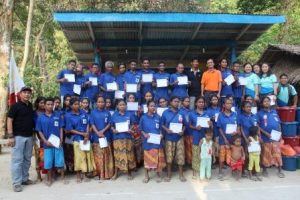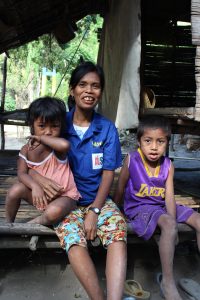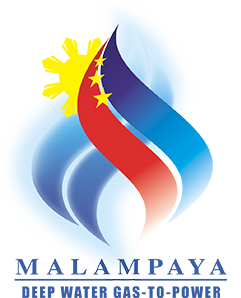Sitio Kalakwasan is six kilometers off the national highway in Puerto Princesa City, Palawan. There are no paved roads leading to the mountain forest community, and getting there requires eleven river crossings. Home to the Batak ethnic tribe, the village is completely inaccessible during the rainy season.
Last April 5 marked a milestone for the education of the tribal community. Aside from the children in kindergarten and elementary graduating from Heaven’s Eyes Tribal Missions’ school, 37 Batak men and women, most of whom are parents and elders, graduated from the Department of Education’s (DepEd) Alternative Learning System (ALS). This is the first ALS graduation in Sitio Kalakwasan, which is conducted by Heaven’s Eyes Tribal Missions with principal sponsorship from Pilipinas Shell Foundation, Inc.’s (PSFI) Integrated Support to Indigenous People (ISIP) programme.

The first ALS graduates of the tribal village in Sitio Kalakwasan hold their certificates while posing for a photo.
It was an exciting day for the Batak tribe, one of the original indigenous hunter-gatherer tribes of the Philippines. There was heightened energy in the community—children were jumping on and off chairs, running around and pushing bicycle tires, or practising their choreographed numbers to the booming music; while the adults were decorating the stage with colourful flowers and garlands.
“Masaya ako kasi tapos na ang pag-aaral namin (I am happy because our studies are completed),” shares Maritess Villanueva, 29, ALS first-place merit awardee, who expressed her gratitude for ALS.
Many Filipinos do not have the opportunity to attend and complete formal basic education due to different reasons, such as the immediate need to work to survive, cost of schooling, and inaccessibility of schools. Indigenous peoples, such as the Batak, are often at a greater disadvantage when it comes to receiving education because of these circumstances. Consequently, many Batak men and women do not know how to read, write, and do basic math.
Because every Filipino has the right to basic education, the Department of Education established the ALS program to provide all Filipinos, especially those who are underprivileged like the Batak, the opportunity to complete basic education in a way that fits their and their communities’ needs.
Girlie Salvador, 37, a widowed basket weaver and a single mother of five, is one of the 37 beneficiaries of the ALS programme in Sitio Kalakwasan. With her young daughter beside her, Girlie says, “Kaya ako sumali sa ALS kasi hindi ako marunong magkwenta (I joined ALS because I don’t know how to count money).”
“Dati, ‘di talaga ako marunong magbudget ng pera (Before, I didn’t really know how to budget our money),” Girlie recalls. “Ngayon, unti-unti na rin akong nakakapagtabi ng pera. At nahahati-hati ko ito, may pang ulam na, may pangbigas, at sa iba pang pangangailangan namin (Now, I save a bit. And I’m able to allocate money for food and other things that we need),” reflects Girlie on her newly acquired budgeting skills through ALS.

Girlie Salvador, 37, of the Batak tribe, is all smiles with her children as she awaits receiving her certificate of completion at the first ALS graduation ceremony in her indigenous community.
Through the joint efforts of Heaven’s Eyes Tribal Missions’ teaching manpower and facilitation, and PSFI’s sponsorship support of educational materials, supplies, modules, infrastructure, and merit-based incentives and rewards to ALS students (e.g. groceries, rice, and homeware), the ALS Basic Literacy Programme has been a beneficial success for the Batak community.
Second place merit awardee, Mary Jane Saavedra, 36, is not only grateful towards ALS and its teachers from Heaven’s Eyes Tribal Missions, but also towards Shell’s altruism, particularly to its Access to Energy (A2E) project that provides electricity through renewable energy sources—solar and hydro—in Sitio Kalakwasan.
“Pagdating sa gabi, nakakapag-aral kami at ang mga anak namin dahil may ilaw at kuryente na (At night, we and our children are able to study because there we have light and electricity now),” she says, referring to Shell’s A2E project. “Nakakagawa rin kami ng mga basket na aming binebenta sa gabi (We can also now make the baskets, which we sell, during nighttime even when it’s dark).”
According to PSFI’s programme manager Benny Veran, “Isang magandang halimbawa ang proyektong ito na kaya rin natin maging maunlad sa sama-samang pagtutulungan na ginagawa ng Shell at DepEd, kasama rin ang Heaven’s Eyes at pamayanan ng Batak sa Sitio Kalakwasan (This is a shining example that we can achieve development through continuous collaboration from Shell, DepEd, Heaven’s Eyes, and Sitio Kalakwasan).” He adds, “Malaking tulong ito sa sustainable development ng ating IPs dito sa Palawan (This is a big help to our IP’s sustainable development in Palawan).”
For the Batak, life was a lot harder then, as they did not know how to read, write and count, which heavily disadvantaged their livelihood. “Kung sa bulag, ‘di ka makakita, kinakapa mo lang lahat (It’s like you’re blindly maneuvering in the dark),” Maritess shares about life before her ALS education.
Now, life for the Batak in Sitio Kalakwasan has improved. “Yung ‘di ko naiintindihan noon, naiintindihan ko na ngayon (What I can’t comprehend before, I can understand now),” former Batak Chieftain Teodorico Villanueva Sr., 64, said with a smile.





